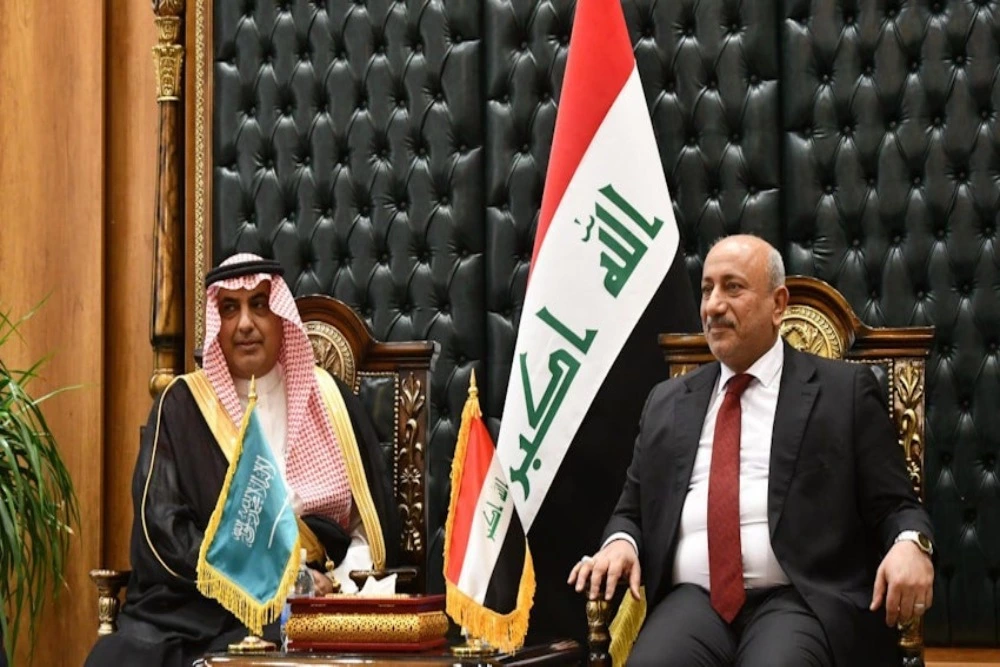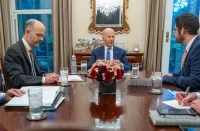
Religious politics actively influences the geopolitical processes of the Middle East region.
Recently, the Kingdom of Saudi Arabia has been demonstrating a clear change in its foreign policy. Although there is an opinion that Riyadh has a certain “multi-vector nature”, where the leadership wants to maintain normal relations with the United States and even, perhaps, normalize contacts with Israel.
But recent events show that the priority for the country’s de facto leader, Crown Prince Mohammed bin Salman, is regional policy in the context of the Islamic world.
In the first half of May 2024, Saudi Arabia’s Ambassador to Baghdad, Abdul Aziz Al-Shammari, paid a visit to the main Shiite shrine in the city of Karbala. The Ambassador was accompanied by the Governor of Karbala, Nassif Al-Khattabi, as well as other officials and religious figures who spoke about “economic and political integration in all areas.” Previously, no Saudi diplomat or any other official had visited Shiite shrines.
This is the tomb of Husayn ibn Ali, the grandson of the Prophet Muhammad and the third Imam of Shia Islam, who is highly revered by all Shiites. The Kingdom of Saudi Arabia belongs to the Sunni branch, and with a Wahhabi interpretation, although there is also a Shiite minority in the eastern part of the country.
The story of Karbala is also interesting because this city was directly affected by the Saudis. Under the first Saudi state, known as the Emirate of Diriyah, in the early 19th century, the shrine of Husayn ibn Ali was looted by followers of the Wahhabi branch of Sunni Islam. According to sources, thousands of civilians were killed during this attack. In addition, it is important to note that Wahhabi Islam fundamentally rejects shrines and other places of pilgrimage associated with religious figures. In fact, according to the Wahhabis, this belongs to the category of bid’ah, that is, an undesirable innovation.
Consequently, Saudi Arabia officially and openly renounces the Wahhabi heritage and recognizes Shiism in all its diversity, which Riyadh had previously zealously opposed. Of course, it should be taken into account that this is happening against the background of the general secularization of the kingdom itself, where concert halls and other places of cultural leisure, previously considered unacceptable, are being actively built. In any case, those radical elements in Saudi Arabia who continue to follow the Wahhabi teachings, one way or another, will be forced to obey the official line. And if they carry out propaganda that runs counter to the position of the authorities, it is likely that they will be subjected to repression.
Arab sources attribute this initiative directly to Crown Prince Mohammed bin Salman Al Saud, who is steadily pursuing a policy of improving relations with his neighbors. There is information that Mohammed bin Salman once told that his mother was a Shiite Muslim. If this is true, it indicates that his personal involvement in improving contacts with the Shiite world has a serious geopolitical effect. And such an open visit to a Shiite shrine may mean serious changes in the near future. Although the Saudi ambassador to Iraq, who has held this position since 2016, has already said that he and the governor of Karbala have agreed “to develop a program of mutual cooperation” that “will include employment opportunities for Iraqi youth” in the holy city.
At the end of April, it was announced the launch of direct flights between the city of Dammam in eastern Saudi Arabia and the southern Iraqi city of Najaf, which is another iconic Shiite place. The tomb of Ali Ibn Abi Talib, the cousin and son-in-law of the Prophet Muhammad, is located in Najaf. Moreover, it is reported that Ambassador Abdul Aziz Al-Shammari plans to travel directly on the first flight on June 1, 2024. The kingdom’s predominantly Shiite minority lives in Dammam and the surrounding areas. The opening of the route is probably intended to increase the flow of pilgrims, since about 25 million pilgrims arrive in southern Iraq every year to make the Arba’in pilgrimage in memory of the martyrdom of Imam Husayn (usually the distance of 82 km between Najaf and Karbala is covered on foot).
It is assumed that if the visit of the Saudi ambassador to Najaf scheduled for June 1 takes place, this “may open the way in the future for the presence of the Saudi consulate” in the city.
Some political observers have suggested that this visit is a positive demonstration of the Kingdom’s approach to regional diplomacy within the framework of its Vision 2030 program.
This program provides for an ambitious diversification program aimed at promoting investment through economic and cultural exchanges.
However, most likely, the background is much broader. In particular, because Iraq itself is important to Saudi Arabia for several reasons. Firstly, the two countries have a fairly long border, and given the negative experience of the emergence of ISIS, Riyadh would like to have its neighbor with an appropriate level of security. Secondly, because of the implementation of a logistics route through Iraq and Turkey, known as the Dry Canal or Development Road.
This is a vital economic project for Iraq, and the country’s authorities “call on everyone to contribute to the success of this project, which represents a link between East and West.”
Back in 2023, the Kingdom of Saudi Arabia expressed its willingness to invest in all provinces of Iraq, and a few years earlier, the country provided Iraq with a loan in the amount of one billion 500 million dollars. Having their part in the Dry Canal project with the receipt of appropriate dividends in the future would be a good opportunity for the kingdom and therefore they will not miss this opportunity. And strengthening mutual trust will contribute to this.
In general, this chain of events shows that even hostility and suspicion for decades can be resolved and the parties are quite capable of constructive dialogue. Relations between the two countries deteriorated sharply after Iraq’s attempted takeover of Kuwait in 1990, although Saudi Arabia had previously supported Iraq in the Iran-Iraq war. After the overthrow of Saddam Hussein in 2003, Riyadh also felt distrust of Baghdad, since the US occupation authorities did not approve of betting on Shiites there, and then the real strengthening of the Shiite faction, which was actively promoted by Iran. Prime Minister Nouri Al-Maliki, who served as head of state from 2006 to 2014, was a Shiite. Relations with Iraq have warmed under Haidari al-Abadi (2014-2018) and Mustafa al-Kadimi (2020-2022), but now we can talk about real fruits in bilateral relations. It is significant that the sectarian strife in Iraq has recently begun to subside.
In 2023, with the mediation of China, Iran and Saudi Arabia fully restored their diplomatic relations (at least, this was announced in Beijing). Although a number of negotiations between the Saudis and the Iranians took place through the mediation of Baghdad. Several rounds of constructive meetings between senior security officials from Riyadh and Tehran took place between 2021 and 2022.
The mention of Iran and China already indicates active players in countering US hegemony in the region and building a multipolar world order. Add to this Russia, with which Saudi Arabia now has good relations (including the test shipment in August 2023 of a railway train along the North-South corridor, where Saudi Jeddah was the final destination), and as a result we will get a new balance of power in the Middle East. Of course, Riyadh is unlikely to openly challenge Washington. From a pragmatic point of view, this is completely unnecessary. However, progressive changes are taking place, and if there are no attempts of external interference and some extraordinary events like a coup, there is a chance that Saudi Arabia will gradually move to more active actions in the club of multipolarity. It is likely that Riyadh will first use its membership in the BRICS, and in the future will participate in other initiatives.














Comments